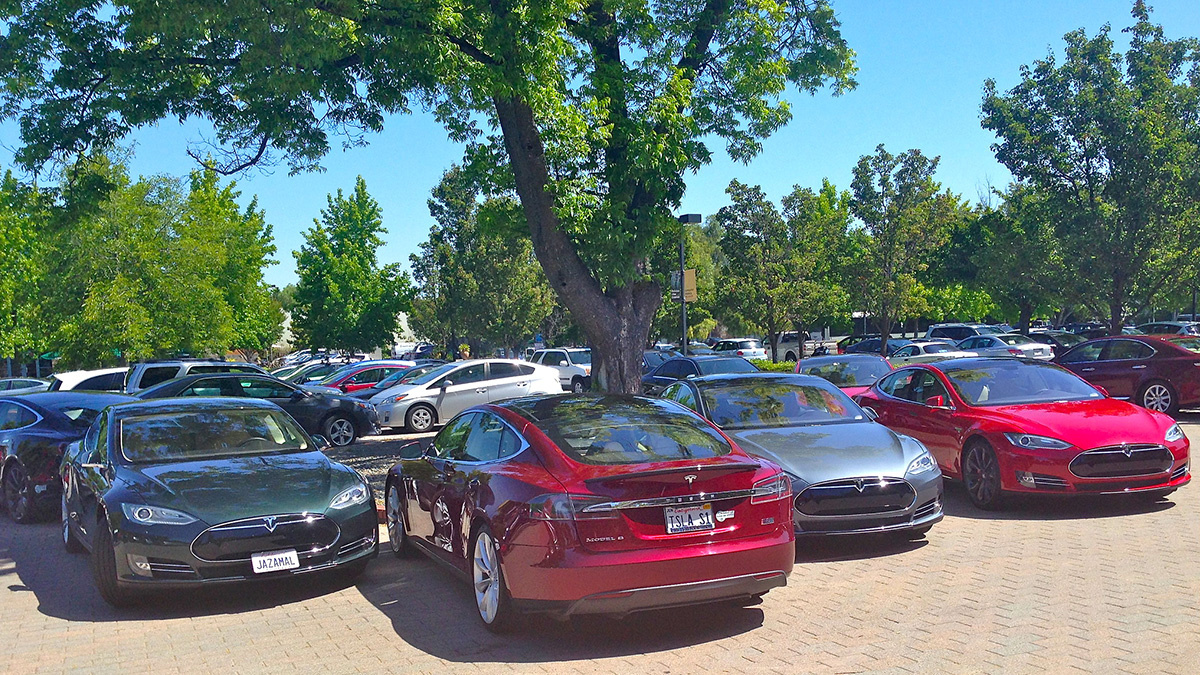
Chuck Schumer Proposes $454 Billion Plan to Swap Gas Guzzlers for Electric Vehicles

Electric cars are parked at the Computer History Museum during the Tesla annual shareholders meeting in Mountain View, California on June 3, 2014. Steve Jurvetson / CC BY 2.0
The Senate’s top Democrat, Charles Schumer of New York, proposed on Thursday a $454 billion 10-year plan to boost the sale of electric vehicles and reduce the number of gasoline-powered cars. His plan would offer cash vouchers to entice Americans to trade in their internal combustion engine car for a car that runs on hybrid, electric or hydrogen fuel cells, according to Reuters.
Schumer said in a statement that his plan would offer rebates of ,000 or more to individual buyers, to help transition nearly one-fourth of the U.S. car and light-truck fleet, or 63 million vehicles, to cleaner technology over the next decade, as Reuters reported.
In an opinion piece in The New York Times, Schumer touted his plan for “its ability to unite the American environmental movement, the American labor movement and large automakers. It has already earned the support of climate groups like the Sierra Club, the Natural Resources Defense Council and the League of Conservation Voters; labor unions like the United Automobile Workers and the International Brotherhood of Electrical Workers; and car manufacturers like Ford and General Motors.”
“We need to act urgently and ambitiously, which will require building diverse coalitions of political support,” Schumer said.
His plan, if ever enacted, would take a significant chunk of carbon emissions out of the atmosphere. Automobiles are America’s largest producer of planet-warming emissions, according to The New York Times.
To reduce vehicular emissions, the U.S. car fleet will need to be overhauled. In the U.S., nearly half of all car sales are SUVs, which over the last decade have emitted more greenhouse gases than planes and ships combined, according to recent research from International Energy Agency (IEA), as CBS News reported.
From 2010 to 2018, “SUVs were the second-largest contributor to the increase in global CO2 emissions since 2010 after the power sector, but ahead of heavy industry (including iron and steel, cement, aluminum), as well as trucks and aviation,” the IEA reported.
Schumer’s plan is far less ambitious than the Green New Deal, which would overhaul the country’s infrastructure and economy in an attempt to stop the climate crisis. It also stands little chance of passing in a Republican-led senate, according to The New York Times.
However, it does make a strategic move as the 2020 campaign season ramps up to appeal to a broad coalition from environmentalists to autoworkers in crucial Midwest states.
The plan would “reduce the number of carbon-emitting cars on the road, create thousands of good-paying jobs, and accelerate the transition to net-zero carbon emissions by mid-century,” Schumer said, as Reuters reported.
Schumer’s plan has three parts. The first is 2 billion in vouchers for Americans to trade in their current car for a zero-emissions vehicle that is manufactured in the U.S. The second part is billion earmarked for cities and states to build charging stations so the infrastructure to power an electric vehicle is more widely available. Finally, the third part is billion given to auto manufacturers to overhaul their factories to enable them to manufacture hybrid, electric and hydrogen vehicles, as The New York Times reported.
“The goal of the plan, which also aims to spur a transformation in American manufacturing, is that by 2040 all vehicles on the road should be clean,” Schumer wrote in his op-ed in The New York Times.
American automobile makers and workers lauded the proposal.
General Motors praised the effort to “advance electrification through much-needed infrastructure investments, consumer incentives and promotion of American electric vehicle manufacturing,” as Reuters reported.
Reuters also reported that United Auto Workers President Gary Jones said in a statement that the Schumer proposal “honors the sweat and sacrifice of American autoworkers by investing in domestic manufacturing of electric vehicles and incentivizing high quality jobs across the auto supply chain.”
Now, the question remains what the future of the proposal will be in a Republican-controlled Senate and with a president hostile to advancing environmental initiatives.
“If this were something that Congress could pass, it could make a difference,” said Kevin Book, an analyst with ClearView Energy Partners, a nonpartisan Washington research firm, to The New York Times. “The question is whether it could ever pass.”
- Trump Wants to Cut Subsidies for Electric Cars, Renewables ...
- Why Aren't School Buses Electric? These Coloradans Are Sick of ...
- Our transportation plan will improve infrastructure and tackle climate ...
- Hey California, you can now trade in your old car for an electric bike ...
- Incentives Of Up To $12,000 In California To Get Low-Income ...
- Hong Kong's electric car trade-in scheme gets boost but why didn't ...
- As More Electric Cars Arrive, What's The Future For Gas-Powered ...

 233k
233k  41k
41k  Subscribe
Subscribe 